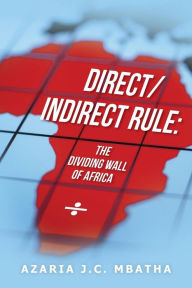
Direct/Indirect Rule: The Dividing Wall of Africa: Direct/Indirect Rule: The Dividing Wall of Africa - Paperback
ISBN: 1482638126
Paperback, [EAN: 9781482638127], CreateSpace Independent Publishing Platform, CreateSpace Independent Publishing Platform, Book, [PU: CreateSpace Independent Publishing Platform], CreateS… More...
| amazon.com |

Direct/Indirect Rule: The Dividing Wall of Africa: Direct/Indirect Rule: The Dividing Wall of Africa - Paperback
ISBN: 1482638126
Paperback, [EAN: 9781482638127], CreateSpace Independent Publishing Platform, CreateSpace Independent Publishing Platform, Book, [PU: CreateSpace Independent Publishing Platform], CreateS… More...
| amazon.com |

DirectIndirect Rule The Dividing Wall of Africa DirectIndirect Rule The Dividing Wall of Africa - Paperback
ISBN: 1482638126
[EAN: 9781482638127], Neubuch, [PU: CreateSpace Independent Publishing Platform], AZARIA J. C. MBATHA,BIOGRAPHIES AND MEMOIRS,TEXTBOOKS, This item is printed on demand. Paperback. 658 pag… More...
| AbeBooks.de BuySomeBooks, Las Vegas, NV, U.S.A. [52360437] [Rating: 5 (von 5)] NEW BOOK Shipping costs: EUR 11.92 Details... |

Direct/Indirect Rule: The Dividing Wall of Africa: Direct/Indirect Rule: The Dividing Wall of Africa - Paperback
ISBN: 9781482638127
Direct/Indirect Rule: The Dividing Wall of Africa: Direct/Indirect Rule: The Dividing Wall of Africa Direct-Indirect-Rule~~azaria-jc-mbatha Biography>Biography Other>Biography Other Paper… More...
| BarnesandNoble.com new Shipping costs:zzgl. Versandkosten, plus shipping costs Details... |

ISBN: 9781482638127
Paperback, [PU: Createspace], Biography: General
| BookDepository.com Shipping costs:Versandkostenfrei (EUR 0.00) Details... |


Direct/Indirect Rule: The Dividing Wall of Africa: Direct/Indirect Rule: The Dividing Wall of Africa - Paperback
ISBN: 1482638126
Paperback, [EAN: 9781482638127], CreateSpace Independent Publishing Platform, CreateSpace Independent Publishing Platform, Book, [PU: CreateSpace Independent Publishing Platform], CreateS… More...

azaria j.c. mbatha:
Direct/Indirect Rule: The Dividing Wall of Africa: Direct/Indirect Rule: The Dividing Wall of Africa - PaperbackISBN: 1482638126
Paperback, [EAN: 9781482638127], CreateSpace Independent Publishing Platform, CreateSpace Independent Publishing Platform, Book, [PU: CreateSpace Independent Publishing Platform], CreateS… More...
DirectIndirect Rule The Dividing Wall of Africa DirectIndirect Rule The Dividing Wall of Africa - Paperback
ISBN: 1482638126
[EAN: 9781482638127], Neubuch, [PU: CreateSpace Independent Publishing Platform], AZARIA J. C. MBATHA,BIOGRAPHIES AND MEMOIRS,TEXTBOOKS, This item is printed on demand. Paperback. 658 pag… More...

Direct/Indirect Rule: The Dividing Wall of Africa: Direct/Indirect Rule: The Dividing Wall of Africa - Paperback
ISBN: 9781482638127
Direct/Indirect Rule: The Dividing Wall of Africa: Direct/Indirect Rule: The Dividing Wall of Africa Direct-Indirect-Rule~~azaria-jc-mbatha Biography>Biography Other>Biography Other Paper… More...
Bibliographic data of the best matching book
| Author: | |
| Title: | |
| ISBN: |
Details of the book - Direct/Indirect Rule: The Dividing Wall of Africa: Direct/Indirect Rule: The Dividing Wall of Africa
EAN (ISBN-13): 9781482638127
ISBN (ISBN-10): 1482638126
Paperback
Publishing year: 2013
Publisher: CreateSpace Independent Publishing Platform
Book in our database since 2014-10-09T22:50:45+01:00 (London)
Detail page last modified on 2020-01-10T22:21:00+00:00 (London)
ISBN/EAN: 1482638126
ISBN - alternate spelling:
1-4826-3812-6, 978-1-4826-3812-7
Alternate spelling and related search-keywords:
Book author: azaria mbatha
Book title: rule
< to archive...


